
In my ongoing search for greatness for my project “Above and Beyond,” I invited the master French chef Daniel Boulud to come to the studio for photos and an interview. Creativity has no boundaries, and can be found in the kitchen as well as on the stage, in the pages of a book, or on a canvas. Boulud, 62, is the owner of 15 restaurants, five in New York and is the author of eight books, including “Letters to a Young Chef.”
Raised on a farm outside of Lyon, France, and trained by renowned French chefs, Boulud made his reputation in New York, first as a chef and most recently as a restaurateur. His company, The Dinex Group, currently includes his restaurants and gourmet groceries (Epicerie Boulud) and Feast & Fêtes Catering. His restaurants include Daniel, Café Boulud, and Boulud Sud.
Not long after opening, restaurant Daniel was rated one of the top ten restaurants in the world by the International Herald Tribune. Boulud, 1992 winner of the James Beard Award for New York City’s Best Chef, the Beard Foundation also named him Outstanding Restaurateur for his restaurant, Daniel.
In 2006, the President of France made Boulud a Chevalier de la Légion d’Honneur in recognition of his contribution to the advancement of French culture.
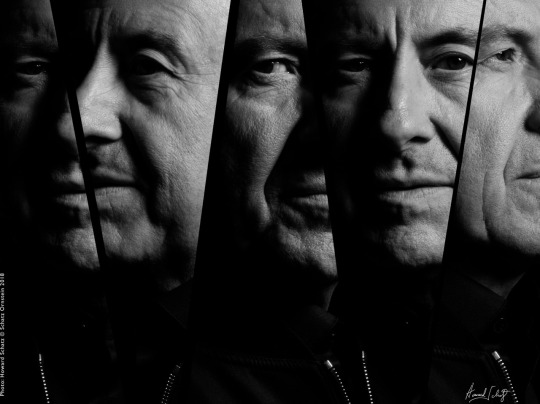
I sat down with Boulud in my studio for an interview.
HS: How do you invent a new dish? What are the steps to coming up with something that hasn’t been done before, or is different from that which has been done before?
DB: An invention or the creation of a dish depends on the time in my life. Sometimes, it is very spontaneous; something that just drove me to make this combination. It could be the season. It could be the ingredient. It could be a technique, a seasoning, or even the place where I am. It could be who I am cooking for.
Creating a new dish is not like creating a piece of art where you’re only going to make one piece then move on to your next one. Creating a dish is maybe to put it on the menu, and it’s to keep it for maybe a month, two months, three months, a year. Forever, if it becomes a classic.
HS: When you create a dish, do you take notes so that it’s more regulated, almost scientific?
DB: Not…exactly. My approach is usually more natural and very spontaneous. Although it could be something calculated, and you are trying to calculate the technique, the ingredients, the sources of the ingredients, and the consistency of the sourcing. And also the taste, the texture, then the presentation. Some dishes require teamwork as well. In the kitchen we work as a team. We sit down and talk. We exchange ideas.
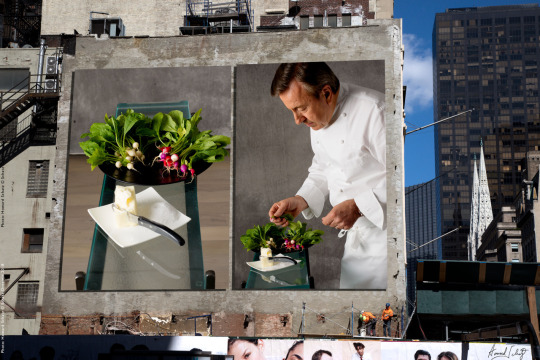
DB, preparing a dish of radishes, salt and butter. Installation on 6th Ave, NYC.
HS: Can you taste something and understand what needs to be changed in order to improve the final result?
DB: Yes, often. It definitely could be the case of tasting a dish, and start to create a slight modifier, or expanding on one flavor more, or a seasoning, or reducing an acidity.
Because there are different ways of creating a dish. Are you creating a dish for a small burst of flavor or a powerful concentration of something? Or are you creating a dish to enjoy over 15, 20 minutes. You discover flavor as you go, you discover texture, you discover taste, and you see a better harmony of things. I think a dish should be a journey. At the restaurant Daniel, for example, we try to renew ourselves all the time.
HS: How do you maintain control? You have many restaurants and many employees, the maître d’s, the waiters, and then the cooking staff. How do you continue the finesse and perfection that are so essential to your work?
DB: It’s the hardest thing. We train our staff very well. We want them to feel that they work for someone they feel proud to represent. They feel that sense of pride. The sense of career and… I hope they feel inspired by what I have done, who I am, and what I have created for my customer.
Many of the staff are very, very young, and they are inexperienced but extremely motivated to learn, to do well, to be an asset. And I think, for me, that’s more rewarding than someone who has too much knowledge and wants to do it his way.
So, we depend on a lot of young people, and we have a lot of success. It’s quite a big family. In New York, I have 250 chefs and cooks working for me.
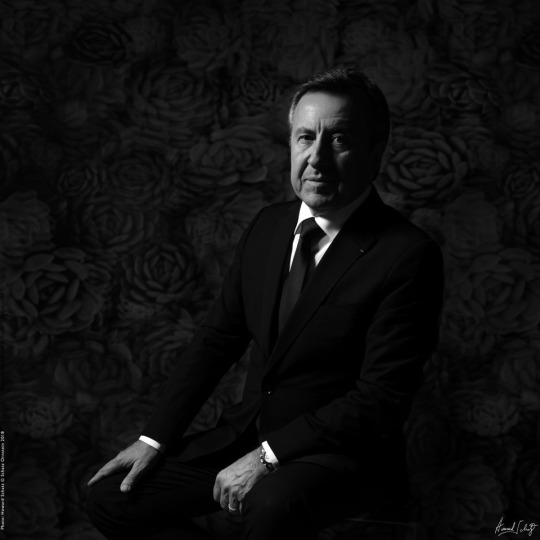
HS: About competition; you share recipes, readily. You’re allowing your recipes out in the world for others to use. Yes, somebody who cooks at home, they use your recipe, that’s no particular threat to your business. But you’re also informing other restaurants and other chefs.
Also you’ve trained some people who’ve learned very well, and they go on and they open their own restaurants. Your children are out there competing with you. The sense of real generosity and openness that you appear to have is quite a remarkable thing.
DB: Yes. Well, I will say, first, the world of cooking has expanded so much. Fifty years ago, in New York City, the chefs kept their recipes almost as a secret. They did not share technique or preparation.
Today, I think we have to be able to share everything, to continue to teach, but continue to create and continue to be different from others. And so, today, you can take ten of the best restaurants in New York, they’re very different, even if they think the same way, they work the same way, they believe in the same standard.
HS: What about chefs that leave you and open their own restaurants and use all your secrets? They know all your techniques, they know all your methods.
DB: I have trained countless young chefs. And some of them leave, and some of them I invest with. I say: “Okay, I want to invest with you because I love you, and I understand you gave a good time of your life with me, and now it’s time for you to do your own.” And, I trust them.
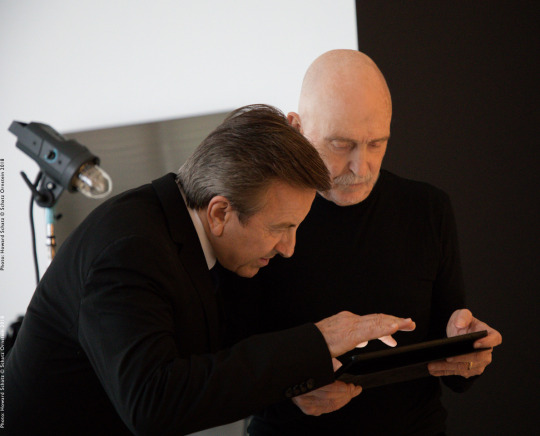
DB, HS looking at images. Details matter, in his field and mine.
HS: About noise in restaurants; it’s sometimes so hard to have a conversation over the music, over the noise, over the boisterous atmosphere.
DB: A restaurant is doing well if there is noise. If there is no noise, there is no customer. The customer is drinking well. So, the more they drink, the more they make noise. I love a lively restaurant, it’s just a question of spacing and comfort. So, Restaurant Daniel, for example, we have always a good buzz. But if you are a table of four, you can still have a conversation without having to overpower the noise of it.
And to me, that’s the good balance. If you are in a bistro and the tables are a little tighter together, and you happen to be between a table of six and a table of four, and you are just two people, it becomes annoying. It’s very difficult. So, we try to be…We try to have a little psychology of care to the customer. So, based on how many people there are and where we place them, then the noisy can be together and the less noisy can be left at peace.
HS: Has there been a Trump effect in your business?
DB: I think, yes, in tourism. I think we have less South Americans, less Europeans, less Asians coming on vacation. It may not be the case in other cities in America, but New York has always depended on huge travel and also very high-end travelers who come here for the food as well, not only just to be tourists.
So, we have felt it there. We didn’t have too much problem with our staff because we already had taken a lot of initiative to make sure that they were all legal. But I’ve heard stories in restaurants who are losing staff because they got deported. And those restaurants got in trouble.
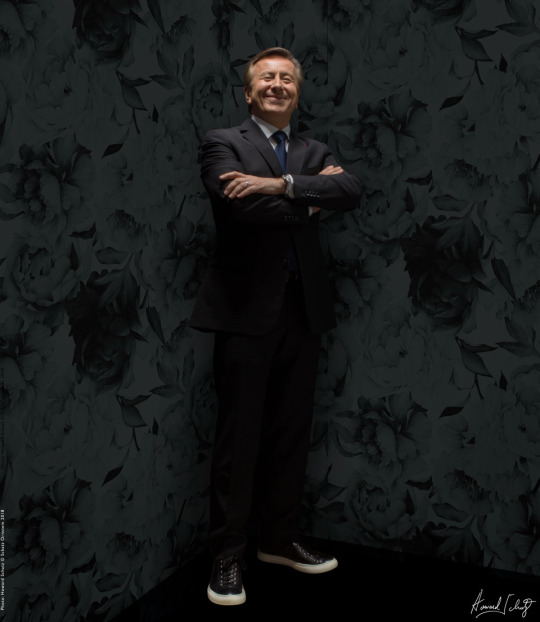
HS: How do you feel about critics?
DB: A critic is necessary, but I don’t think it’s a fair review when a critic only comes twice in a year, or three times, and then doesn’t come back for five or six years.
We care, and we are very sensitive to Trip Advisor and Yelp, and all that. We care for the regular people who come. And they can be a critic, can have an opinion, can have an experience great or maybe disappointing. We are sensitive to that as well.
Yelp and others have not diminished the power of a critic, but they have definitely evened things out, a little bit, letting us have access to our public, be able to be in conversation with the consumer also. I think one should never be scared of a critic, but one should always be aware that there could be a critic any day, any time, in the restaurant.
I have been very blessed with the critics. And I’ve been frustrated with them, also, but it’s okay. I have been in New York, cooking now for 35 years. And I’ve seen ten food critics at the New York Times. And, I’m still standing.
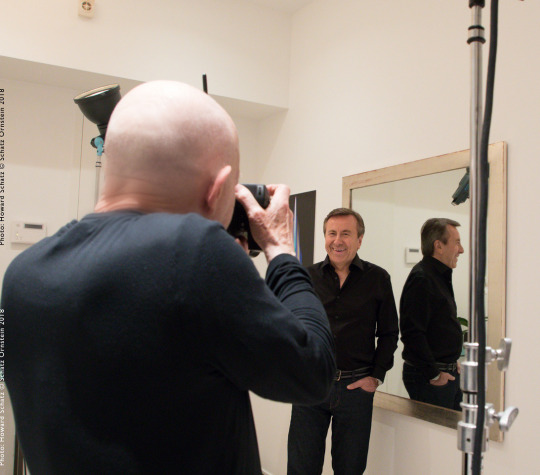
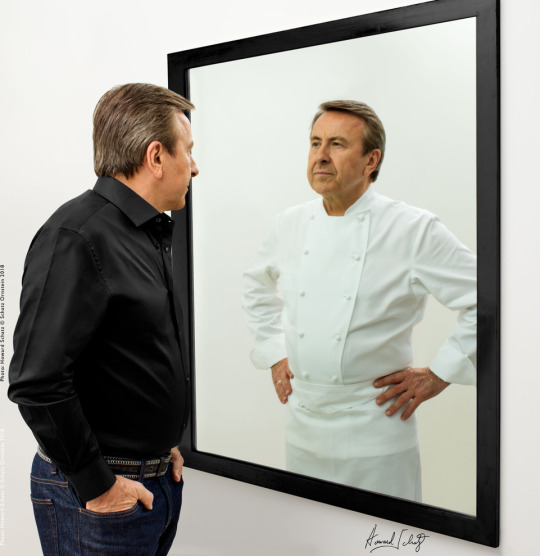
The Chef and the Business man.
